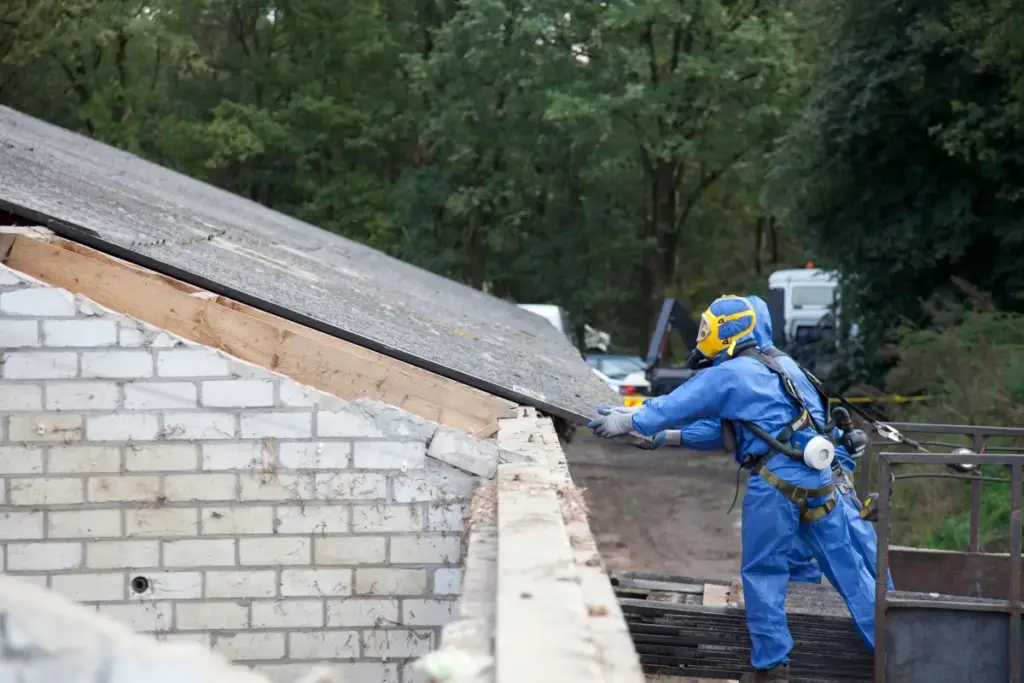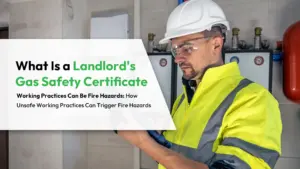Is It a Legal Requirement to Have an Asbestos Report? If you own or manage a property built before 2000, you’re likely aware of the potential presence of asbestos, but do you know “Is it a legal Requirement to have an Asbestos Report or not”?. Under the Control of Asbestos Regulations 2012, non-domestic properties must assess and manage the risk of asbestos. However, the rules for residential homes are less clear-cut and can vary depending on specific circumstances. It’s essential to understand your responsibilities not only to comply with the law but also to ensure the safety of everyone who enters your property. But what about penalties for non-compliance, or the specifics of who should arrange such a report?
Table of Contents
ToggleKey Takeaways
- Asbestos reports are legally required for all non-domestic properties constructed before 2000, as per the Control of Asbestos Regulations 2012.
- Property owners must conduct surveys to identify asbestos and provide tenants with updated asbestos management plans.
- For renovations or demolitions, a specific asbestos survey is mandatory to prevent the disturbance of any ACMs.
- In commercial settings, regular asbestos inspections must be documented and communicated to all related parties.
- Non-compliance with asbestos regulations can lead to substantial fines, criminal charges, and increased liability.
What Is an Asbestos Report and Why Is It Important for Property Safety
An asbestos report identifies the presence and condition of asbestos-containing materials (ACMs) in a property, ensuring the safety of residents and workers. You can’t see or smell asbestos, so this report is essential for identifying hidden dangers that could affect your health.
When asbestos fibres are inhaled over time, they can cause severe lung diseases, including cancer. Consequently, knowing if these materials are in your building and evaluating their condition is crucial.
The report involves a thorough inspection by certified professionals, who collect samples of suspected materials for analysis in a lab. They’ll check various parts of your property, like insulation, floor tiles, and roofing.
The results indicate whether the ACMs are intact or have the potential to release fibre. If asbestos is found, the report will guide you on the next steps, such as managing or removing the materials safely.
Knowing what an asbestos report includes for UK properties helps owners understand their responsibilities and maintain a safe environment for everyone. Learn more about what is asbestos and identifying its risks in residential and commercial properties.

When an Asbestos Report Is Legally Required Under the Control of Asbestos Regulations 2012
Under the Control of Asbestos Regulations 2012, you must have an asbestos report if you manage or have duties concerning the maintenance of non-domestic premises. This regulation manages the risks associated with asbestos exposure, which can lead to serious health issues.
Here’s what you need to know about when an asbestos report is necessary:
- Building Ownership: If you own a building constructed before 2000, you’ll likely need a report to identify any asbestos-containing materials (ACMs).
- Renovation Plans: Before any refurbishment or demolition work, an asbestos report is required to guarantee that no ACMs are disturbed during the process.
- Legal Compliance: Failing to comply with these regulations can result in hefty fines and legal repercussions, emphasising the significance of maintaining up-to-date asbestos reports.
- Health and Safety: The primary aim is to protect the health of anyone who might come into contact with asbestos at your property, including employees and visitors.
The asbestos report legal requirements under UK law ensure that any building likely to contain asbestos is appropriately assessed and documented by a competent professional.
Asbestos Reporting Requirements for Residential Homes and Private Properties
For residential homes and private properties, asbestos reporting requirements are less stringent than for commercial spaces, but they are still essential for ensuring safety.
In the UK, asbestos safety in homes and private properties is regulated under the Control of Asbestos Regulations 2012. These laws require residential asbestos surveys to identify, assess, and properly manage the asbestos if it could be disturbed during maintenance, refurbishment, or demolition work.
- Private homeowners are not legally required to obtain an asbestos report unless they plan work that might disturb asbestos materials. However, a survey is strongly advised for properties built before 2000 to identify and control any risks early.
- In case of residential homes, if you are a landlord, you have a legal duty to manage asbestos in any shared or common areas of rented properties, such as hallways, stairwells, or basements. You must also be aware of its presence within the property itself and take reasonable steps to prevent exposure.
- These responsibilities are supported by the Health and Safety at Work etc. The 1974 Act and the Housing Act 2004 require landlords to ensure their properties are safe and free from hazards.
- A licensed contractor must handle any asbestos removal or repair in line with Health and Safety Executive (HSE) guidance.
Homeowners are not legally obliged to have an asbestos report; landlords and managing agents must actively identify, record, and manage asbestos risks to remain compliant with UK safety regulations and protect all occupants.
Do Homeowners Need an Asbestos Report Before Renovation or Sale?
Before you start renovations or prepare your home for sale, it’s essential to evaluate whether you need an asbestos report. Asbestos, a hazardous material found in many older homes, can pose serious health risks if disturbed.
Here are key points to reflect on:
- Local Regulations: Check with your local health department or building authority. Some areas require asbestos reports before renovations or property transfers, especially in older homes.
- Age of Home: If your home was built before the 1980s, it’s more likely to contain asbestos materials. Common asbestos-containing materials include insulation, floor tiles, and roofing.
- Scope of Renovation: The extent of your renovations might require an asbestos report. If you’re planning significant structural changes that could disturb materials, an asbestos inspection is advisable.
- Sale of Property: Providing a clean bill of health regarding asbestos can be a selling point. It reassures potential buyers about the property’s safety.
Getting a professional asbestos inspection can help you navigate these requirements and provide peace of mind.
Asbestos Report Guidelines for Flats and Shared Residential Buildings
In flats and shared residential buildings, asbestos management responsibilities apply mainly to the common or communal areas of the property. These include hallways, staircases, service ducts, plant rooms, roof spaces, and other zones shared by multiple occupants. The person responsible for maintenance, often the landlord, freeholder, or managing agent, must ensure that any asbestos present in these areas is identified and safely managed.
An asbestos management survey should be carried out to locate and assess the condition of asbestos-containing materials (ACMs). The results are recorded in an asbestos register, which should be updated regularly and made accessible to contractors and maintenance staff before any work begins.
Inside individual flats, an asbestos survey is not generally required unless refurbishment, repair, or demolition work is planned. However, when shared systems or structures connect several units, those areas fall under the same management duties as communal spaces.
Type of Asbestos Surveys Required for HMOs (Houses in Multiple Occupation)
HMOs are subject to stricter safety standards under the Housing Act 2004 and the Management of Houses in Multiple Occupation (England) Regulations 2006, which require landlords to ensure their properties are free from health hazards, including asbestos exposure.
Typically, you’ll need a Management Asbestos Survey as a minimum. It identifies asbestos-containing materials (ACMs) that could be disturbed during everyday use, cleaning, or minor maintenance. The findings must be recorded in an asbestos register and kept up to date.
However, if you’re planning any refurbishment or demolition work in your HMO, you’ll also need a Refurbishment and Demolition Survey. This survey is required before any major refurbishment, conversion, or demolition work is carried out in the HMO. It is more intrusive and designed to locate hidden asbestos in walls, ceilings, floors, and other structural elements.
It’s essential because it identifies asbestos that could be disturbed during structural work, ensuring that any necessary measures to manage or remove it are implemented before work begins.
Asbestos Report Obligations for Commercial Properties and Offices
You must adhere to specific asbestos report obligations if you manage or own commercial properties and offices. These regulations are vital for ensuring the safety of everyone who enters your buildings, from employees to clients.
Here are key points you’ll need to take into account:
- Identification of Asbestos-Containing Materials (ACMs): You’re responsible for determining whether asbestos is present in your building. This involves a thorough inspection by a certified professional who can identify ACMs and assess their condition.
- Documentation: All inspection findings must be clearly documented. This includes the locations, conditions, and types of ACMs found. This documentation must be updated regularly and available for review.
- Communication: It’s critical to inform anyone who might be affected of the presence of asbestos. This includes employees, tenants, and contractors. Clear signage and access to the asbestos management plan are essential.
- Accessibility of Information: Ensure all asbestos-related information is readily accessible. This means maintaining an asbestos register that’s readily available to those who need it, especially during maintenance or renovation projects.
Meeting these obligations isn’t just about following the law; it’s about ensuring a safe and healthy environment. Business owners in the UK are required to get done asbestos surveys for commercial buildings to protect staff, clients, and visitors.
When Businesses Must Arrange an Asbestos Management Survey
Determining the right time to conduct an asbestos management survey is fundamental for your business’s compliance and safety.
You’re required to arrange a survey if your business operates in a building constructed before the year 2000, when asbestos use was commonplace in construction. This guideline is significant because asbestos, if disturbed, can release fibres harmful to health.
You must also consider a survey if you’re planning renovations or major maintenance work. Knowing the presence and condition of any asbestos-containing materials (ACMs) guarantees that you can plan work safely and comply with legal requirements to protect your workforce and others.
Regular surveys aren’t just a one-off task. If your initial survey identifies ACMs, you’ll need ongoing management surveys to monitor their condition.
This is particularly important if your building is exposed to environmental conditions that could degrade materials, such as frequent temperature changes or potential water damage.
Asbestos Regulations for Industrial Buildings and Construction Sites
Although asbestos is heavily regulated across various sectors, specific rules apply to industrial buildings and construction sites to guarantee worker safety and environmental compliance.
You need to be aware of these regulations to make sure you’re not only complying with the law but also protecting your employees and the environment.
Here are key points to take into account:
- Asbestos Surveys: Before any construction or renovation work begins, it’s critical to conduct a thorough asbestos survey. This helps identify any asbestos-containing materials (ACMs) that might be disturbed during the work.
- Notification Requirements: If asbestos is found, you must notify the appropriate regulatory body before starting work. This notification must include details about the location, quantity, and condition of the asbestos.
- Safe Removal Practices: Employing certified asbestos removal professionals is a must. They’ll use approved methods to safely remove, handle, and dispose of the asbestos materials.
- Regular Monitoring: Once asbestos is identified and during its removal, regular air-quality monitoring is essential to ensure fibres aren’t released into the environment or pose a health risk to workers.
Understanding and following these guidelines will help you manage asbestos risks effectively on your industrial site or construction project.

Asbestos Reporting in Public Buildings: Schools, Hospitals, and Community Centres
Public buildings such as schools, hospitals, and community centres must adhere to strict asbestos reporting guidelines to guarantee the safety of their occupants. You’re likely familiar with these places as essential hubs of activity, where health and safety are paramount. Asbestos, if present, poses significant risks, particularly in older buildings.
Understanding the requirements can help confirm that these environments remain safe for everyone. Here’s what you need to know about asbestos reporting in these public spaces:
| Building Type | Key Reporting Requirement |
| Schools | Annual inspection and management plan updates |
| Hospitals | Immediate reporting of any asbestos discovery |
| Community Centers | Regular risk assessments and record keeping |
| All Public Buildings | Accessibility of reports to the public |
You must stay up to date with these guidelines. Schools, for instance, must not only conduct annual inspections but also regularly update their asbestos management plans. Hospitals have an even greater urgency to report any asbestos findings immediately, given the high-risk environment.
Community centres, while less intensive environments, still require regular assessments and meticulous record-keeping. Moreover, all these reports must be accessible to the public, confirming transparency and community trust.
Who Is Responsible for Arranging an Asbestos Report — Landlord, Owner, or Employer?
When arranging an asbestos report, responsibility can vary depending on the property’s nature and the relationships among the parties involved.
Let’s break down who might be responsible:
- Landlords: If you’re renting out property, you’re typically responsible for guaranteeing the building is safe and compliant with health regulations, including asbestos management.
- Property Owners: As a property owner who isn’t leasing out space, you’ll need to manage asbestos risks in your premises. This is vital before any renovation or demolition work.
- Employers: If you’re leasing workspace, you must ensure the environment is safe for your employees, which may involve requesting an asbestos report from the landlord.
- Management Companies: Sometimes, especially in commercial or shared spaces, a management company oversees safety compliance, including obtaining necessary asbestos reports.
You should always check local laws and regulations, as they can dictate specific responsibilities.
It’s also wise to consult a professional when in doubt. Guaranteeing safety from asbestos isn’t just a legal obligation but a vital step in safeguarding health.
Penalties for Failing to Obtain an Asbestos Report or Breaching Asbestos Laws
Failing to comply with asbestos regulations in the UK is a serious offence that can lead to both financial and legal consequences. The Health and Safety Executive (HSE) actively enforces asbestos laws and can take action against property owners, landlords, or duty holders who do not meet their responsibilities.
If a property owner fails to obtain an asbestos report or neglects to manage known asbestos materials, they may face hefty fines, enforcement notices, or even prosecution. Penalties vary depending on the severity of the breach, but fines can reach tens of thousands of pounds, and in severe cases, offenders can receive custodial sentences.
Businesses and landlords can also be held liable if tenants, workers, or contractors are exposed to asbestos fibres due to negligence. The lack of an up-to-date asbestos report can constitute a failure to comply with the Control of Asbestos Regulations 2012, leading to potential shutdowns or work restrictions until compliance is achieved.
Frequently Asked Questions
How Can I Safely Dispose of Asbestos After Its Removal?
To safely dispose of asbestos, you must wet it, seal it in labelled plastic bags, and take it to an approved landfill. Don’t attempt it alone; hiring certified professionals is safer for you.
What Health Risks Are Associated With Asbestos Exposure?
You’re at risk of lung diseases, including cancer and asbestosis, from asbestos exposure. Symptoms might not appear for years, making early detection and preventive measures critical to protect your health.
How Often Should Asbestos Surveys Be Updated?
You should update your asbestos survey every few years or if significant changes occur in the building. Regular updates help ensure safety and regulatory compliance, preventing health risks from exposure.
Can I Conduct an Asbestos Survey Myself or Hire a Professional?
You can conduct an asbestos survey yourself if you’re trained, but it’s safer and often required to hire a professional. They have the expertise to guarantee the study is done correctly and safely.
What Are the Typical Costs Involved in Obtaining an Asbestos Report?
You’ll typically spend between $200 and $800 for an asbestos report, depending on your property’s size and complexity. Larger buildings or those with extensive contamination may push costs higher.
Conclusion
As a property owner or business, it’s your duty to guarantee safety by obtaining an asbestos report, particularly if your building was constructed before 2000. Don’t overlook this vital step; it protects not only legal standing but also the health of everyone involved. Whether Is it a legal requirement to have an asbestos report is a question every responsible property owner should ask before starting any work. Whether managing a home renovation or overseeing a public facility, staying compliant with asbestos regulations is paramount. Remember, failing to do so could result in significant penalties. Make safety your priority.




